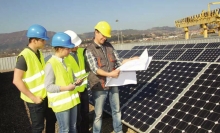The Australian Services Union (ASU) and other unions win a just transition deal for ENGIE Hazelwood workers with the State of Victoria and local energy employers

In November 2016, French energy multinational ENGIE – formerly GDF-Suez – announced the closure of the Hazelwood coal power generation plant and of its adjoining mine by March 2017, impacting the livelihoods of over 1,500 workers and their families. Active since the 1960s in the region, Hazelwood was a major employer in the Latrobe Valley community.
PSI affiliate the Australian Services Union (ASU), together with its national federation the Australian Council of Trade Unions (ACTU), asked the Andrews Labour Government of the State of Victoria to intervene and play a facilitation role with ENGIE and with other power industry actors in the region, AGL and Energy Australia, to negotiate a transfer scheme for displaced Hazelwood workers.
Former Federal Minister Simon Crean was appointed by the government to act as a facilitator between the unions and employers at all generators and mines.
In November 2016, the ASU and ACTU convened an important public conference called “A fairer, cleaner future - Uniting for a Just Transition - A plan for the electricity sector” to debate a just energy transition. This was a first step in the process that led to the Latrobe Valley Agreement.
The Agreement involves Energy Australia’s Yallourn as well as AGL’s Loy Yang and Loy Yang B power stations. It covers permanent workers as well as contractors with continuous presence, and guarantees the transfer of at least 150 skilled workers, while implementing a voluntary early retirement scheme. It acknowledges the value and skills of Hazelwood workers and provides for adequate training to bring the redundant workers into their new positions.
The Labour Government of the State of Victoria is spending $ AUD 20 million on the scheme that will finance, among others, the early retirement scheme and upskilling programmes. The worker transfer scheme is part of an unprecedented $266 million transition package for the Latrobe Valley – which includes the $50 million Economic Growth Zone to support business growth and the establishment of the Latrobe Valley Authority.
Commenting on the conclusion of the Agreement, member for Eastern Victoria Harriet Shing said, “This scheme is the end result of tireless work from the Government, local trade unions and Latrobe Valley generators to obtain the best outcomes for Hazelwood workers.” [1]
Ged Kearney, ACTU President, said, “This scheme, which now covers the entire Latrobe Valley power sector, is a world-leading example of how to manage the transition of an industry in a way that prioritises the employment and wellbeing of workers and their communities… We are proud of the role that the union movement has played alongside government and employers, and believe that this serves as an example of the kinds of leaps policy can make when these three groups work together to deliver new job opportunities for workers.”[2]
The Latrobe Valley Worker Transfer Scheme Partnership Agreement is an important step in the right direction, not only for the State of Victoria but for Australia as a whole, and can serve as an example for other countries.
The COP21 Agreement on Climate Change signed in Paris in December 2015 calls on Governments, and indirectly on companies, to reduce their carbon emissions in line with Intended Nationally Determined Contributions.
The ENGIE CEO has already signalled that the company strategy is ‘to become leader in the energy transition’ and that the strategic key words are ‘decarbonized, digital and decentralised’[3]. ENGIE EU operations are undergoing significant restructuring, which in January 2016 led to the signature of a Transnational company agreement between ENGIE and EU Federations the European Public Service Union (EPSU) and IndustriAll Europe, involving provisions for worker capacity building and upskilling in the energy transition phase.
This is why the ASU – together with its national federation ACTU - is calling on the Australian Government and energy companies to develop a fully-fledged energy transition plan and establish a central authority to ensure no worker, family or community in Australia falls behind in the implementation of the transition commitments and that energy companies respect their social responsibilities.
A just transition clause is contained under Art. 2.2 of the Global Framework Agreement with former ENGIE entity GDF-Suez, of which global unions PSI and IndustriAll are signatories, that says that the company actively supports “Just Transition” principles, for which the International Labour Organization (ILO) has issued specific guidance.
Article prepared with the contribution of the ASU.
[2] Source: http://www.asu.asn.au/news/categories/energy/170501-all-major-energy-companies-now-included-in-historic-latrobe-valley-worker-transfer-scheme
[3] Le Monde Economie, “Isabelle Kocher: “Un groupe comme ENGIE ne se transforme pas facilement”, 02.03.2017 http://www.lemonde.fr/economie/article/2017/03/02/isabelle-kocher-un-groupe-comme-engie-ne-se-transforme-pas-facilement_5088021_3234.html
More information
Global Framework Agreement with former ENGIE entity GDF-Suez

